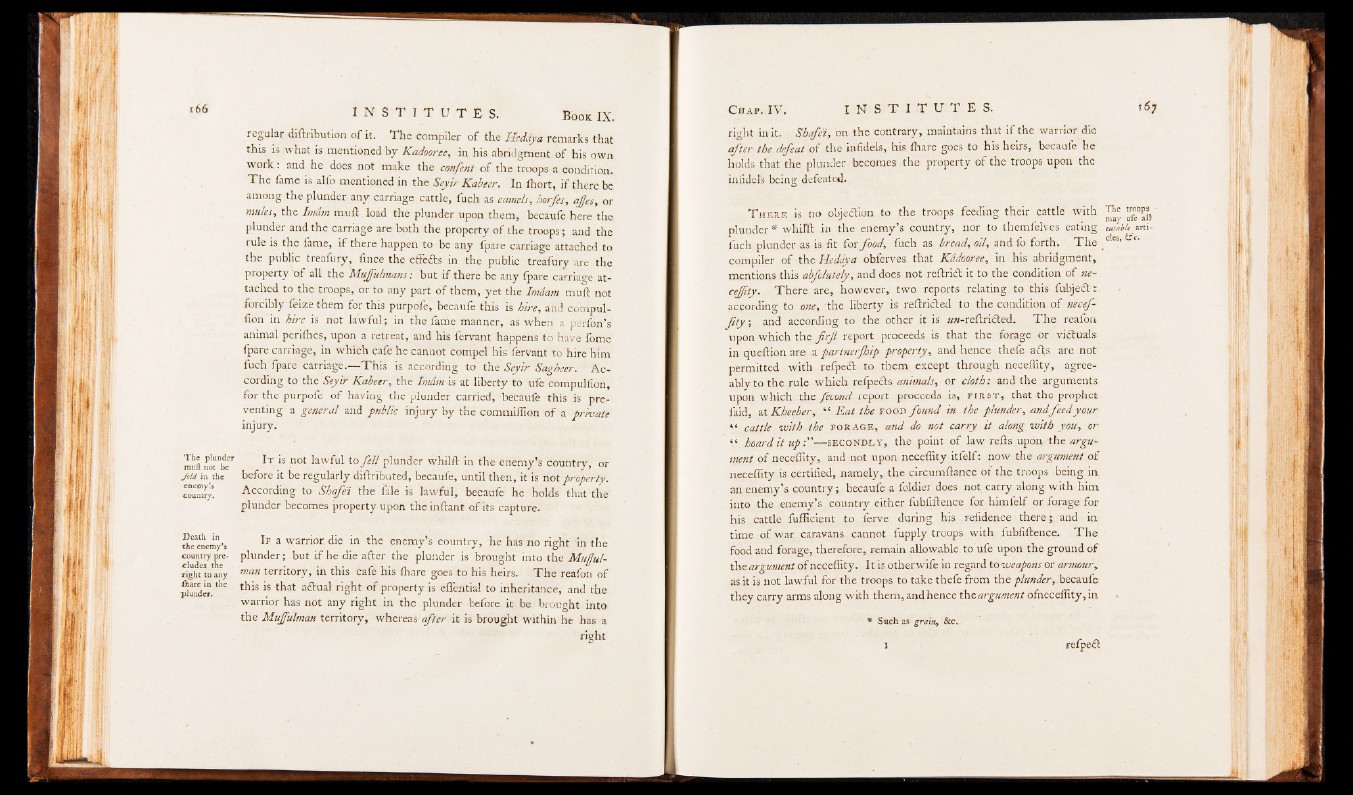
The plunder
rnull not be
fo ld in the
enemy's
country-
Death in
the enemy’s
country precludes
the
right to any
ihare in the
plunder.
regular diftribution of it. The compiler of the He day a remarks that
this is what is mentioned by Kadooree, in his abridgment of his own
w o ik : and he does not make the confent of the troops a condition.
The fame is alfo mentioned in the Seyir Kabeer. In Ihort, if there be
among the plunder any carriage cattle, fuch as camels, borfes, ajjes, or
mules, the Imam mi;ll load the plunder upon them, becaule here the
plunder and the carriage are both the property of the troops ; and the
rule is the fame, if fhere happen to be any fpare carriage attached to
the public treafury, fince the effefts in the public treafury are the
property 'qf all the Mujfulmans: but if there be any fpare carriage attached
to the troops, or to any part of them, yet the Imdam mull not
forcibly feize them for this purpofe, becaufe this is hire, and compul-
lion in hire is not lawful; in the fame manner, as when a perfon’s-
animal perilhes, upon a retreat, and his fervant happens to have fome
fpare carriage, in which cafe he cannot compel his fervant to hire him
fuch fpare carriage.— This is according to the Seyir Sagheer. A c cording
to the Seyir Kabeer, the Imdm 'xs at liberty to ufe compulfion,
for the purpofe of having the plunder carried, becaufe this is preventing
a general and public injury by the commiffion of a private
injury.
I t is not lawful to fe ll plunder whilft in the enemy’ s country, or
before it be regularly diftributed, becaufe, until then, it is not property.
According to Shafe'i the fale is lawful, becaufe he holds that the
plunder becomes property upon the inftant of its capture.
If a warrior die in the enemy’s country, he has no right in the
plunder; but if he die after the plunder is brought into the Muflul-
man territory, in this cafe his fhare goes to his heirs. The reafoti of
this is that actual right of property is eflential to inheritance, and the
warrior has not any right in the plunder before it be brought into
the Mujfulman territory, whereas after it is brought within he has a
right
right in it. Shafe'i, on the contrary, maintains that if the warrior die
after the defeat of the infidels, his lhare goes to his heirs, becaufe he
holds that the plunder becomes the property of the troops upon the
infidels being defeated.
T here is no objection to the troops feeding their cattle with T^e '
plunder * whifft in the enemy’s country, nor to themfelves eating taiaiU arti-
fuch plunder as is fit for food, fuch as bread, oil, and fo forth. T h e _ce5’
compiler of the Heddya obferves that Kddooree, in his abridgment,
mentions this abfolutely, and does not reftridt it to the condition of ne-
cefity. There are, however, two reports relating, to this fubjedt
according to one, the liberty is reftridted to the condition of necef
fity ; and according to the other it is «»-reflricted. T h e reafon
upon which the fir jl report proceeds is that the forage or vidtuals.
in queftion are a partnerjhip property, and hence thefe acts are not
permitted with refpedt to them except through necelfity, agreeably
to the rule which refpedls animals, or cloth: and the arguments
upon which the fecond report proceeds is, f i r s t , that the prophet
laid, at Kheeber, “ Eat the f o o d found in the plunder, and feed your
“ cattle with the f o r a g e , and do not carry it along with you, or
“ hoard it up:"— s e c o n d l y , the point of law refts upon-the argument
of neceffity, and not upon neceffity itfelf: now the argument of
necelfity is certified, namely, the circumftance of the troops being in
an enemy’s country; becaufe a foldier does not, carry along with him
into the enemy’s country either fubfiftence for himfelf or forage for
his cattle fufficient to ferve during his refidence there; and in
time of war caravans cannot fupply troops with fubfiftence. T h e
food and forage, therefore, remain allowable to ufe upon the ground o f
the argument of neceffity. It is otherwife in regard to weapons or armour,
as it is not lawful for the troops to take thefe from the plunder, becaufe
they carry arms along with them, andhence the argument ofneceffity, in
* So.ch.as graitty & c .
1 refpedt